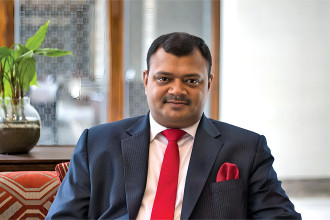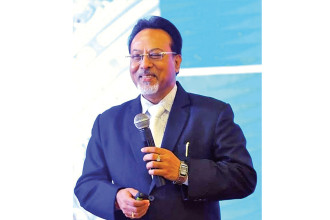
Vikram Singh
General Manager, Aloft Kathmandu Thamel
The biggest shift I have seen is that travellers today expect more than just accommodation, they want immersive experiences, personalisation and convenience. Digitalisation and sustainability have also become core priorities
With over 25 years in the hospitality industry, Vikram Singh, General Manager of Aloft Kathmandu Thamel, has built a career that spans Asia, the Middle East, Europe, America and Africa. His journey has been guided by a passion for people, service excellence and creating meaningful guest experiences. At Aloft, he leads a dynamic team that has positioned the property as one of Kathmandu’s most vibrant destinations for both business and leisure travellers.
Under Singh’s leadership, Aloft Kathmandu Thamel has emerged as more than just a hotel. It has become a lifestyle hub that blends Marriott International’s global standards with the cultural energy of Thamel. From live music and rooftop dining to wellness facilities and versatile spaces, the property is redefining what modern hospitality looks like in Nepal’s capital.
As Nepal’s hospitality landscape evolves rapidly with new international and boutique hotels, Singh believes Aloft’s edge lies in delivering immersive experiences and consistent value.
In a conversation with Business 360, he shared his insights on the country’s tourism growth, shifting traveller expectations and Aloft’s role in shaping Kathmandu’s hospitality scene. Excerpts:
How do you see the current hospitality landscape in Nepal, especially in Kathmandu? What are the biggest shifts you have noticed in recent years?
The industry is evolving rapidly. When we started, there were only a few branded hotels in Kathmandu, but since then, the city has seen the emergence of over 10 to 12 new international and branded properties. It has been inspiring to witness the growth in professional standards within the hospitality sector in Nepal and the confidence of the investors and brands have shown in the future of hospitality in Nepal.
The biggest shift I have seen is that travellers today expect more than just accommodation, they want immersive experiences, personalisation and convenience. Digitalisation and sustainability have also become core priorities.
Price wars are often at the centre of the hotel business. How does Aloft navigate this?
Price competition is inevitable due to demand and supply in the area but at Aloft, our focus has always been on value. We do not compete solely on rates; instead, we differentiate through service quality, lifestyle-driven experiences, and Marriott’s global standards. Guests choose us because they feel they are getting more than a room, they are becoming part of a vibrant, modern community where a value for immersive experience is generated across genres.
Hotels require constant upkeep and maintenance, especially in a competitive urban setting like Thamel. What practices has Aloft adopted to stay ahead?
At Aloft, we follow routine preventive maintenance and Marriott’s global property standards by adopting practices that ensure we stay ahead, while also maintaining continuous repair and upkeep across all areas of the hotel based on guest feedback and process.
With so many international and boutique hotels in Kathmandu, what do you see as Aloft’s main edge over the competition?
Aloft’s main edge lies in blending Marriott’s international reliability with Thamel’s local energy, creating an ever-evolving modern lifestyle experience that goes beyond robotic hospitality. Our vibrant atmosphere, from live music and rooftop spaces to creative dining, combined with standout features like Nepal’s only Aloft Club Lounge, a full-service spa, top-tier gym, and Urban Rooms, sets us apart. Add to that our spacious, well-designed rooms, a motivated team, and consistently high guest satisfaction, and Aloft stands out not just as a hotel, but as Kathmandu’s complete lifestyle destination.
Looking ahead, how do you see the tourism industry in Nepal shaping up over the next five years?
Nepal is well-positioned for tourism growth, with adventure and spiritual travel remaining core attractions while wellness tourism, MICE (Meetings, Incentives, Conferences, Exhibitions), gastronomy, and cultural experiences show rising potential. Continued infrastructure development, strategic promotion and Nepal’s proximity to China and India can help establish the country as a year-round global destination. Additionally, growing interest in sustainable and eco-friendly travel aligns perfectly with Nepal’s natural and cultural strengths. Investment in hospitality standards, technology and connectivity will further enhance the visitor experience, enabling Nepal to diversify beyond adventure tourism into a broader tourism leader in South Asia.
With the emergence of mega-clubs like LOD and Nova, Kathmandu also has the opportunity to become a party hub for Indian and Chinese youth, adding a vibrant urban dimension to its tourism offerings.
You have played a significant role in putting Aloft Kathmandu Thamel on the map. What personal achievements are you most proud of during your time here?
As the general manager for the hotel, I am proud to have built a strong team culture also, directly reflected in our high guest satisfaction. The property has earned multiple prestigious awards but our greatest achievement has been navigating the pandemic and emerging stronger, more resilient and more connected with our community. This success is made possible thanks to the guidance and support of our Chairman, Prithivi Bahadur Pande, our Board of Directors, the entire hotel team and the Marriott South Asia Team.
Global travel trends are changing fast, especially with shifts in traveller preferences post-pandemic. What trends do you see as most relevant and how can Nepal capitalise on them
Today’s travellers are seeking health, authenticity and flexibility; essentially, genuine experiences. Experiences rooted in nature, culture and wellness are highly valued, and Nepal can capitalise on this by offering itineraries that combine adventure with holistic wellness and immersive cultural activities. Gastronomy is another emerging trend with Nepal’s organic produce and diverse culinary offerings providing a unique opportunity to attract food-focused travellers.
Sustainability is becoming increasingly important in hospitality worldwide. What steps has Aloft taken to integrate sustainable practices?
Sustainability is not only a priority at Aloft but also at Marriott International. We are proud to be one of the first ISO 14001:2015 certified hotels in Nepal and we also hold the Waste Smart Certificate, reflecting our commitment to responsible operations. Our eco-friendly practices span water conservation, waste reduction and energy management, ensuring that sustainability is embedded into every aspect of our operations and soon we shall be an LEED certified hotel as well.
Through CSR initiatives like Soap for Hope, we recycle used hotel soaps into sanitised bars for local communities, while plastic waste is repurposed into flower pots and guest amenities are offered in sustainable bamboo and even old linens are recycled. These efforts combine social impact with environmental responsibility and resonate strongly with today’s travellers, strengthening their connection with the brand while aligning with the global shift toward responsible and meaningful travel.






